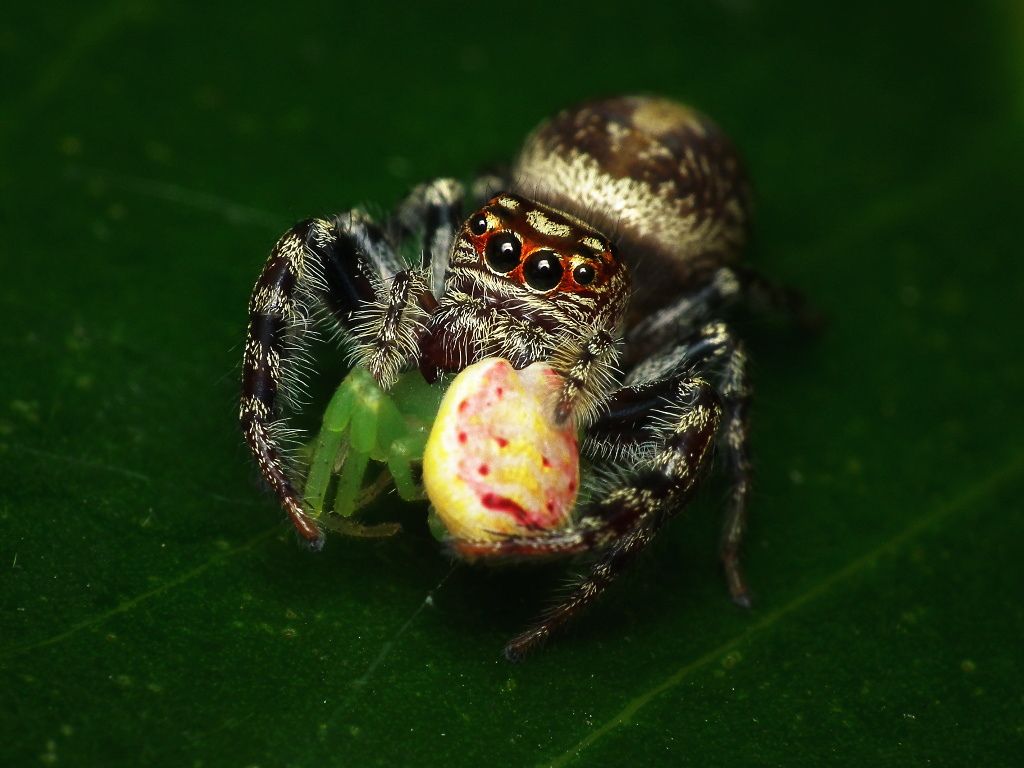
If you want to woo a female Australian jumping spider, consider tracking down her private, silk-draped retreat—and definitely be on the lookout for a virgin. That's according to a paper published today in the journal PLOS ONE.
The paper recounts two experiments that researchers conducted to determine whether Servaea incana spiders, a common species in Australia, experience mating-induced sexual inhibition. That's a phenomenon in which females are uninterested in—or even aggressive toward—potential additional mates immediately after mating. It's been studied in species like fruit flies, moths and even hamsters, and scientists think that it's a way males can reduce the amount of competition their sperm faces to fertilize the female.
But in most cases, scientists only watch females' behavior in the immediate aftermath of that original mating. Vivian Mendez, the lead author on the new paper and an ecologist at Macquarie University in Australia, wanted to do one better by studying the spiders' behavior over their entire lives. In an email, she told Newsweek she was surprised to find that mating-induced sexual inhibition lasted so long—for the rest of the spider's life in about half of the individuals studied.
The team also wanted to understand the choices females were making based on the environment, so they tested two different scenes: one out in the open, where spiders could watch one another's movements more easily but were more vulnerable to predators, and one in human-made substitutes for the silk-draped retreats females in the wild decorate in eucalyptus trees as love nests (and as literal nests after they lay eggs). In retreats, the insects face less risk of being eaten, but males may need to step up their courtship game to impress the female in a smaller space.
Mendez and her colleagues split spiders between these two environments to try to understand the mating preferences female spiders were displaying. The scientists started with females they had collected as immature spiders, so they knew were virgins. The newly adult spiders were offered a potential mate each day for 10 days, then one every 10 days, regardless of when they first decided to accept a male's advances.
The scientists found that females were much pickier about their first mate when they were out in the open, with half as many settling for the first male they met. And all of the spiders given love nests mated within four males, whereas some particularly picky spiders left unsheltered went through 20 males before condescending to accept an offer. Females were also less likely to remate if they were left in the open, with just one-third of them accepting a second male as opposed to half of the hidden spiders.
The scientists aren't sure yet whether the no-longer-virginal female spiders are passing on all males. They may also have simply raised their standards dramatically once they have some sperm and know they'll be able to pass on their own genes. Then, it could pay to be picky.
Uncommon Knowledge
Newsweek is committed to challenging conventional wisdom and finding connections in the search for common ground.
Newsweek is committed to challenging conventional wisdom and finding connections in the search for common ground.
About the writer
Meghan Bartels is a science journalist based in New York City who covers the science happening on the surface of ... Read more
To read how Newsweek uses AI as a newsroom tool, Click here.








